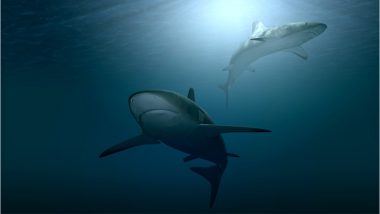Canberra, November 6: A shark has killed a man in an island harbor on Australia's Great Barrier Reef where two tourists were mauled on consecutive days in September in a spate of attacks that has left authorities struggling to explain an apparent escalation in danger in an internationally-renowned vacation destination.
The 33-year-old victim was among 10 friends who set out from Airlie Beach on the Queensland state mainland on Monday morning on a rented yacht to sail themselves on a five-day cruise through the idyllic Whitsunday Islands, Police Inspector Steve O'Connell said.
They anchored 23 kilometers from Airlie Beach in Cid Harbor, intending to spend their first night in the popular, protected anchorage on Whitsunday Island, the uninhabited largest island in the group, he said. A 50-Year-Old Naked Body Surfer at the Nudist Beach Headbutted a Shark Then Fought It Off by Punching It.
The victim was taking turns with a woman standing on a paddle board or swimming in the harbor late Monday afternoon. He had dived into the water to give the woman her turn on the board when he was attacked, O'Connell said.
There were more than a dozen yachts in the harbor at the time. French-speaking tourists launched a dinghy from their yacht and rescued the man, O'Connell said.
They brought the victim to his own yacht, where most of the group had medical backgrounds, including two doctors. "Despite their best efforts, the injuries were too severe," O'Connell told reporters.
The victim was taken by helicopter to the Mackay Base Hospital, 100 kilometers (60 miles) to the south, where he died. "CPR was ongoing for a very long time and every solid effort was made to save that man's life," O'Connell said, referring cardiopulmonary resuscitation. "They did everything imaginable to try to save the man. It's just — the injuries were so severe," he added.
A 46-year-old tourist, Justine Barwick, was attacked on Sept. 19 while swimming from a yacht in Cid Harbor and is recovering. A 12-year-old tourist, Hannah Papps, was attacked in the same harbor while swimming from a yacht the next day, losing a leg.
The last shark attack in the Whitsunday Islands before the latest spate occurred on Feb. 13, 2010, off Dent Island where 60-year-old tourist Patricia Trumbull survived lacerations to her buttocks and major blood loss. Tourism Whitsundays chief executive Peter O'Reilly said at the time that the Trumbull attack was the first in the islands in 13 years and only the third ever recorded.
Daniel Gschwind, chief executive of the Queensland Tourism Industry Council, which represents more than 3,000 tourism businesses, said on Tuesday that authorities were methodically examining why the unprecedented series of attacks had occurred and whether environmental changes were a factor.
"We need to now have the scientific background and investigation of what is causing this sudden spike of attacks and interactions with sharks. We simply do not know why this is occurring and what is responsible for it, "Gschwind said.
The species of sharks involved in the attacks have not been identified. Police and fisheries boats were patrolling Cid Harbor on Tuesday and advising tourists on yachts to keep out of the water, O'Connell said.
Authorities killed six sharks in the Cid Harbor area in a week following the September attacks in a bid to reduce their numbers in the popular tourist location. Critics argued that killing sharks was not the answer.
Gschwind called for a science-based response to the latest tragedy.
Australia had not experienced a fatal shark attack since April 17 last year and it has averaged fewer than two deadly shark attacks per year in recent decades.













 Quickly
Quickly


